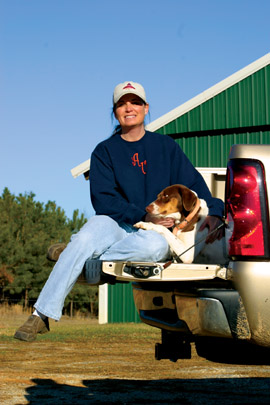WOMAN’S WORK: More Women Find Farm Work To Their Liking

It’s 7 a.m. and Shana Hunt is walking through her chicken houses. She is about to begin the task of gathering eggs. Not just a few to cook for breakfast, but a few thousand to send to a hatchery. This is not just a way to gather food for the family or to make extra money — poultry farming is Shana’s career, and she is not alone. According to Herb Vanderberry, state statistician with the National Agricultural Statistics Service of the U.S. Department of Agriculture, the number of female farmers in America has increased 110 percent over the past 25 years.Answers may vary as to what caused this increase, but Shana says the rewards of owning her own farm are priceless. “I would not trade it for anything in the world,” she said. Many of Alabama’s female farmers are happily married women who could have their pick of professions, but each has chosen to run a farm that provide critical financial support to her family and food for her community. Shana, who operates two layer houses, knows that being a female farm owner is far from easy. “Mostly, in this type of work, you deal with men,” she said. “But I won’t let anyone keep me from standing my ground.”Shana grew up on a farm where her father farmed row crops and raised hogs. She inherited land and decided to build chicken houses in 1992. She currently operates two layer houses and plans to build two more this spring. Shana primarily does all the work herself, although she does have help from her mother, Nell W. Sanders, and her husband, Jason, when he gets home from his job in Troy. Since Jason helps, he gets a first-hand look at the work Shana does on a daily basis.
“I’m real proud of her. She works hard,” Jason said. “She’s impressed me. That’s for sure.” It is easy to see why Jason is proud of his wife. With Shana’s current two houses, she already gathers 13,000 to 14,000 eggs per day, seven days a week during peak production and is eager to get her new houses up and running. Work for Shana is not limited to gathering eggs. With Jason’s help, she also has to take care of completely cleaning out the houses between flocks. This is no easy task, considering everything in the house has to be sanitized in preparation for a new flock. Of course, manual labor is part of having a prosperous poultry business, but Shana says a special touch also is necessary. “Women have a God-given nurturing instinct,” she said. “I try to help any chickens I see in distress. I have compassion for them.”
Monica Carroll, who also operates a poultry and produce farm, agrees that compassion is a key component to success.
“It’s natural for women to want to take care of the little chicks,” she said. Monica became involved in farming when she married her husband, Chris, 10 years ago. Her husband raises beef cattle, and she wanted to create a new entity to the family farm that would be her responsibility and her’s to make prosper, so they decided to build chicken houses.
Monica enjoyed poultry farming, but also knew there was more potential on the family’s farm. In 2003, she began her produce business. “This was something that I wanted to do to get the children involved while still allowing Chris to work full-time on the farm,” said Monica. Monica’s business accomplished her goal of getting the children involved, and much more. Beginning with 15 acres, the Carrolls are now planting 54 acres in produce and considering increasing the total to 65. Her crops include peas, tomatoes, corn, yellow squash, zucchini, eggplant, peppers, potatoes, watermelon and, for the first time this year, strawberries. Monica admits that operating her part of the family farm has not always been easy.
“What I had to do was decide that I am just as much a part of this farm as Chris,” said Monica. “Sometimes, we women just have to prove ourselves.”Sometimes this proof is simply knowledge. Edie Grover, who raises sheep, goat and rabbits in Elmore County, points out that people are sometimes surprised at how much she knows about her animals. Edie has been involved in farming for 22 years and believes being an expert in your field helps both your business and your ability to educate others. “You have to arm yourself with as much knowledge as you can,” Edie said. “You have to know all aspects of your business so you can explain it to others.” Jeannie Bragg Harvey, a fourth-generation farmer whose farm produces soybeans, corn and cotton in Madison County agrees. “I’m just as knowledgeable as the next guy,” she said. “That’s how you have to be to be successful.” Attention to detail also is important, according to Jeannie.
“Women tend to be detail-oriented. It has certainly benefited me in my bookkeeping,” Jeannie added, while explaining how much paperwork is involved in owning a farm.This attention to detail, combined with compassion and determination to succeed, could be the reasons farms operated by women are successful and increasing in number. It is not always easy for women to compete in a business widely considered “a man’s world,” said Sarah Lazzari of Baldwin County, a member of the Alabama Farmers Federation’s State Women’s Committee.However, considering 62 percent of female farmers have owned their farms for 10 years or more, according to the USDA, it is obvious that female farmers are in the business for the long run. “Women have to prove their capabilities, where men are assumed to be capable,” said Sharon Turner of Geneva County, another Women’s Committee member.
It seems female farmers in Alabama are well aware of that and are determined to prove themselves, using hard-earned skills, a fine-tuned attention to detail, and good, old-fashioned hard work.
